All For the Sake of Science
 I was very impressed with my students this past week. We had our 2nd Annual Science Fair, and I'd say on average, the projects were even better than last year. They have learned a lot, and many have learned how to correctly apply science. We had only three students not show up- one because he was sick, and one because he didn't do anything all year long, even to the point of picking a topic. So that's a pretty good percentage- 33 projects to judge. Especially when you add in that one student who did show up came despite a car accident on the way.
I was very impressed with my students this past week. We had our 2nd Annual Science Fair, and I'd say on average, the projects were even better than last year. They have learned a lot, and many have learned how to correctly apply science. We had only three students not show up- one because he was sick, and one because he didn't do anything all year long, even to the point of picking a topic. So that's a pretty good percentage- 33 projects to judge. Especially when you add in that one student who did show up came despite a car accident on the way.It was a bit of a different experience for me than last year, as two classes- Chemistry and Foundations Physical Science- were not taught by me, so I found myself in the new position of not knowing what the project was ahead of time or everything about the particular science that the student was explaining. Which I appreciated- I'd like them to know more than me through this endeavor. Even the Foundations classes had excellent projects that in some cases surpassed those of the standard Physical Science classes.
I wish in some ways this went all day- then I could fully appreciate and enjoy the projects when presented. For I and 3 other science teachers (Lisa, Joe, &; Cyndi) had to judge the proects too- and at 3-6 minutes per project, that took a full three hours. And I didn't feel like I could give full justice to most projects in that short amount of time. But we met from 5-8, and then present awards after 1/2 an hour of tabulating. We were looking for overall presentation, but mostly at science- Did the student include a hypothesis? A control? Multiple trials? Quantitative data as well as Qualitative data? More points given to experiments over research surveys. Did the students list any possible errors, as well as reasons why their results might be invalid? (Have they learned about the honesty that is expected by scientists in their reporting? And I'm pleased to say that most of my students had.) Did they give a good explanation of the implications of their results? If a research survey, is it copiously researched? Are their full source cited properly annotated, especially for the most common source, the www?
We had so many excellent projects, it was hard to choose from them all. There were some students who obviously put far less work into it than the 20 hours minimum, and some who put in more work into the presentation and very little into the science, but overall it looks like they worked pretty hard on their presentations.
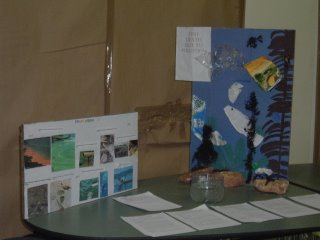
We gave out three awards for most Artistic, in each of the three classes. This was an award to focus exclusively on presentation, as opposed to the pure science of it all. In Biology, it went to Hamza Naoume, who reported on the effects of pollution on fish. This project was exceptionally done scientifically as well, with good method and multiple trials, analyzing how fish do in various types of pollution and how long they survive. Ironically, the most artistic award here went to a student who gave a poster covered with trash he had personally collected from the Corniche, the beach near Casablanca.
In Chemistry Shenim Chugani and Sophia Nouira did a presentation on perfumes they had created,
 and it was very beautifully constructed. It was actually one of three that we would have given Best Smelling to if we could- along with Rachel Martin and Michelle Friesen's presentation on household cleaning products they had made and tested (they found their own cleaner was environmentally sound and a better cleaner as long as it had hot water), and Julia
and it was very beautifully constructed. It was actually one of three that we would have given Best Smelling to if we could- along with Rachel Martin and Michelle Friesen's presentation on household cleaning products they had made and tested (they found their own cleaner was environmentally sound and a better cleaner as long as it had hot water), and Julia 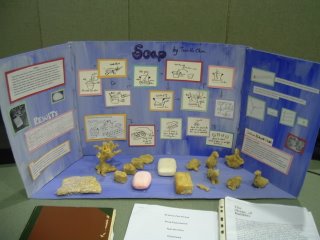 Smith's presentation involving various spices. Also well designed and well researched was Tsai-Ho Chiu's work on soap, where she experimented to see which type of soap (store bought and hand made) was the best cleaning, and then she even impressively hand carved the soap into various shapes.
Smith's presentation involving various spices. Also well designed and well researched was Tsai-Ho Chiu's work on soap, where she experimented to see which type of soap (store bought and hand made) was the best cleaning, and then she even impressively hand carved the soap into various shapes.Lastly, there was an amazing presentation in Physical Science by Kawtar and Zineb, with so many displays and diaramas, three dimensional and two dimensional, that they couldn't all be caught in one photo. It was on waves, both wind-driven and tsunamis, and how Tsunamis are caused by plate tectonics. Particularly impressive were their didactic demonstrations using multi-coloured sand to show the Earth's layers, demonstrating how convergent and divergent boundaries work. They learned something!
Then for the best in particularly sciences. We broke Physical Science down into it's various disciplines, and any Physical Science students who chose to do Chemistry then competed with the Chemistry students for the Chemistry award. Honors Marine Biology, AP Biology, and Biology were all competing for the same Biology award. (And in fairness to AP, it must be mentioned that they spent most of the year getting ready for their AP test, and had only the last few weeks to work on a project.)
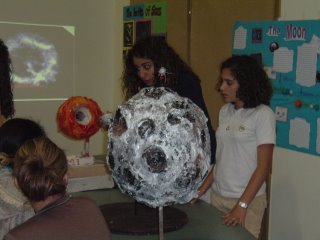 In Astronomy we had a project looking at Luna, our personally favorite moon, which Nada Touzani and Lina Joundy demonstrated very well.
In Astronomy we had a project looking at Luna, our personally favorite moon, which Nada Touzani and Lina Joundy demonstrated very well.Meteorology was won by Younes El Gameli and Aman Sharma, looking at that thing that's going to change everyone's lives, Global Warming- despite the claims by some of it's nonexistance. So glad no one died in that Hurricane in New Orleans.
In Geology Amit Nagrani & Anit Sharma learned a great deal about landslides and had some excellent displays on how landslides work.

In Physics, Abla Alami showed how a piece of metal could be heated to complete a circuit, allowing a light to turn on. She designed the apparatus herself.
Chemistry had a number of well done topics. Jeremiah Dias and Nathan Mills knew
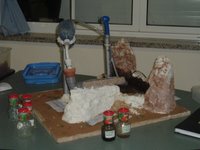 a lot about Halogens. Monisha Chugani and Salim Lahlou designed their own water purification kit. Rachel and Michelle presented excellent research on their household cleaning products. Nikhil Aswani looked at crystal growth
a lot about Halogens. Monisha Chugani and Salim Lahlou designed their own water purification kit. Rachel and Michelle presented excellent research on their household cleaning products. Nikhil Aswani looked at crystal growth as only a mad scientist can. The final award went to Meriem Benkirane and Issam Skalli for a project looking at various toothpastes, store-brought and homemade, and their effects on teeth, using similar
as only a mad scientist can. The final award went to Meriem Benkirane and Issam Skalli for a project looking at various toothpastes, store-brought and homemade, and their effects on teeth, using similar  substances to teeth, egg shells, and comparing the results to a control.
substances to teeth, egg shells, and comparing the results to a control.Biology was particularly difficult to judge, as there were so many excellent projects. Zineb Lebbar spent some time with Gelidium sesquipedal, a type of red algae, looking at it's abilities to grow in various degrees of
 salinity and temperature. Zouheir Akbary learned everything about anemones, and then did a short experiment looking for the presence of symbiotic photosynthetic zooxanthalle by putting the same species in dark areas and light areas and observing their
salinity and temperature. Zouheir Akbary learned everything about anemones, and then did a short experiment looking for the presence of symbiotic photosynthetic zooxanthalle by putting the same species in dark areas and light areas and observing their 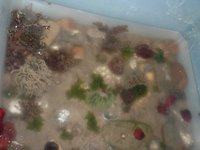 colour changes. Hamza El Haouti put plants in various locations to observe how they respond to light. In a well-presented study, Taylor Ried and Gabe Luckey messed
colour changes. Hamza El Haouti put plants in various locations to observe how they respond to light. In a well-presented study, Taylor Ried and Gabe Luckey messed with their dog's mind by Pavloving it to come to a bell, using multiple trials on the same specimen. From this they discussed conditioned responses in general.
with their dog's mind by Pavloving it to come to a bell, using multiple trials on the same specimen. From this they discussed conditioned responses in general.The final award went to Bobby Canner and James Johnson (for which two of the judges, being Bobby's parents, recused themselves from the decision). They looked at the effects of salinity on marine plants and animals, using 4 different species with a control in each case, 2 that were terrestrial plants and 2 that were estuary plants. Then they did one trial on a freshwater fish placed in marine water to
 observe the effects of being in a hypertonic environment. (The fish closes it's operculum to stop breathing, but continues living for about half an hour.)
observe the effects of being in a hypertonic environment. (The fish closes it's operculum to stop breathing, but continues living for about half an hour.)I lied though, to say that the Best in Biology was the above. For the Best in Show award was also a Biology experiment (and therefore of course not win Best in Biology). The aforementioned Julia gave pure science, looking at natural barriers to Formicidae- ants. Not only was there a control, with many trials, and many different substances, ranging from cinnamon to papikra; not only did she honestly cite errors and reasons to invalidate her research; not only did she cite suprising results from her research and give excellent source citations- but she also was the only one to give hard, quantitative data, with specific numbers, ratios, and trends for which substances repelled ants the most.
 I would love to say that that final presentation was the most impressive, but I think I must reserve that for the student who didn't come to the fair because he got sick at the last moment. Kamal Boulhimez's presentation on nuclear power was still brought in by his sister, who was also in the science fair- a very nice diarama of a nuclear power plant. And he had told his sister that when Mr. Abdul Muhib walks by, pour this substance into the funnel. Which she did. After which a decidedly noxious substance arose out of the funnel, and I'm still waiting to see what the long term health effects of it were. When confronted, Kamal assured me that there was no problem- it was only the ingredients to dynamite. My student, I am pleased to report, was not trying to poison me. He was just trying to blow me up.
I would love to say that that final presentation was the most impressive, but I think I must reserve that for the student who didn't come to the fair because he got sick at the last moment. Kamal Boulhimez's presentation on nuclear power was still brought in by his sister, who was also in the science fair- a very nice diarama of a nuclear power plant. And he had told his sister that when Mr. Abdul Muhib walks by, pour this substance into the funnel. Which she did. After which a decidedly noxious substance arose out of the funnel, and I'm still waiting to see what the long term health effects of it were. When confronted, Kamal assured me that there was no problem- it was only the ingredients to dynamite. My student, I am pleased to report, was not trying to poison me. He was just trying to blow me up.
Comments
This was supposed to be a 20 hour project you worked on all year long.